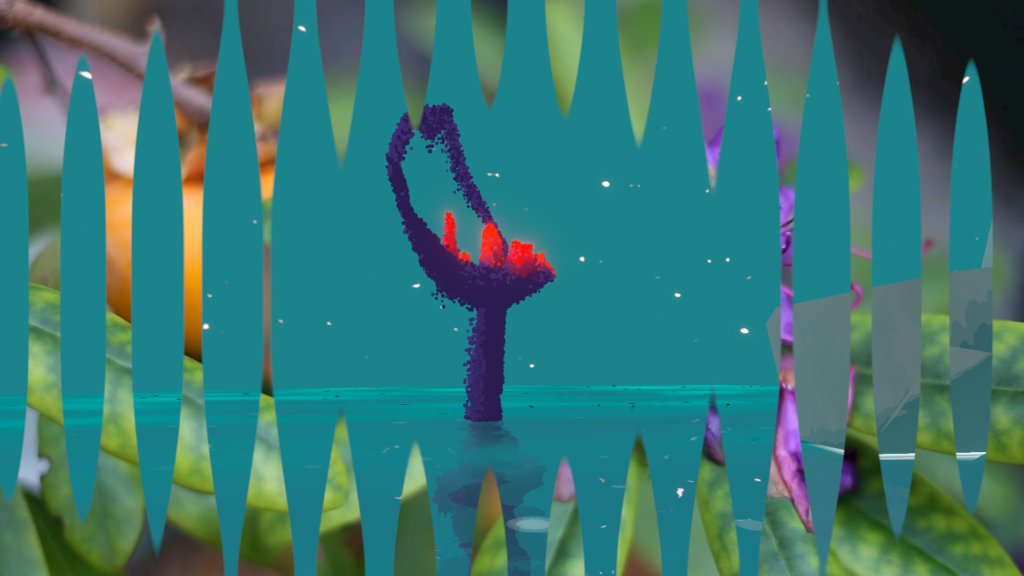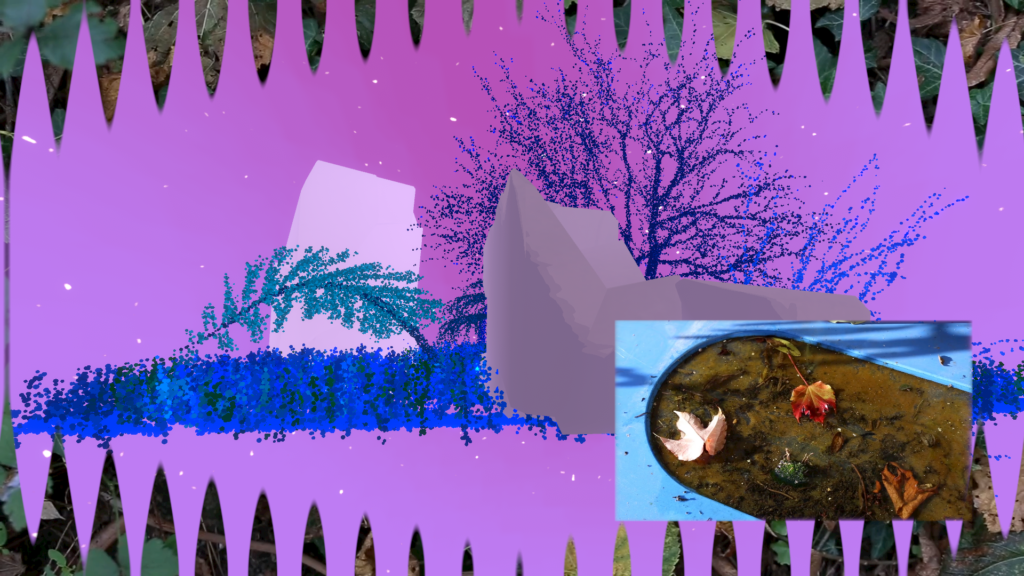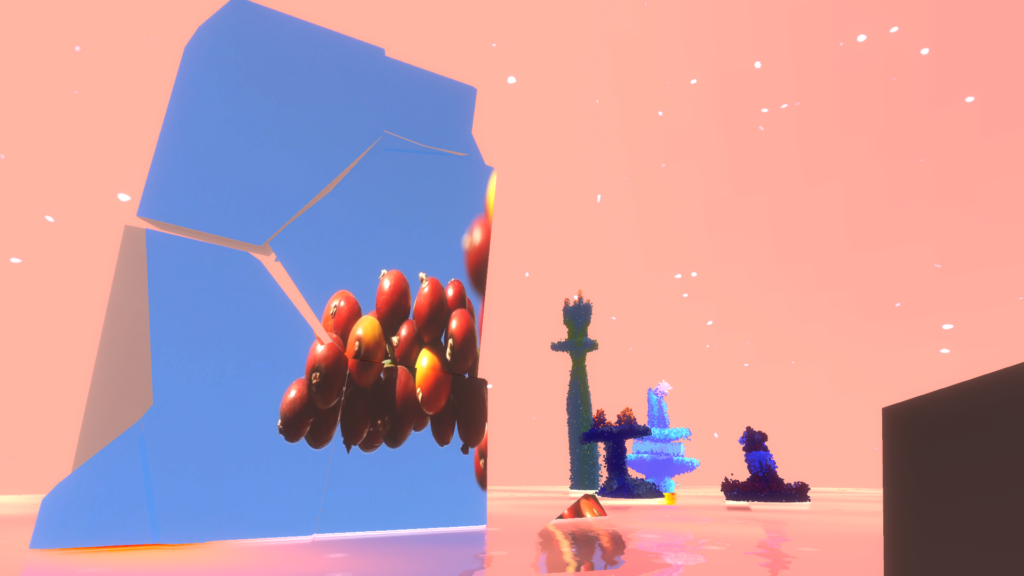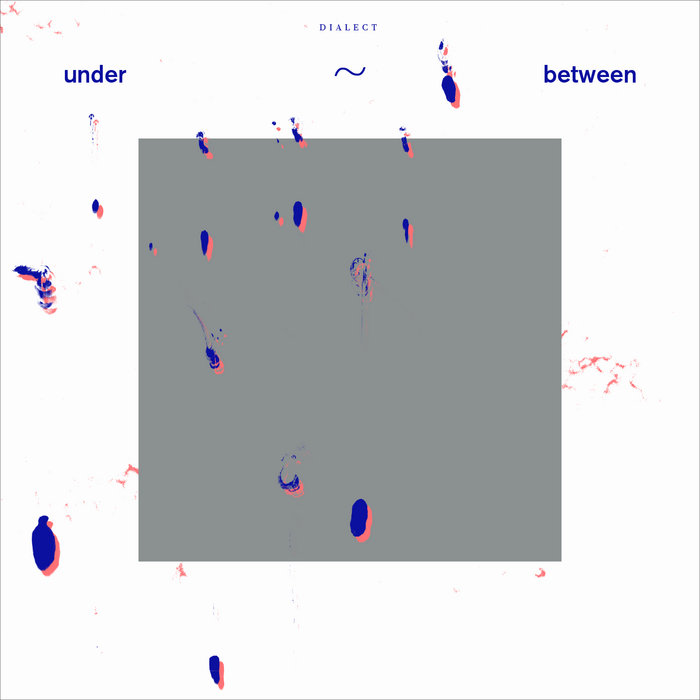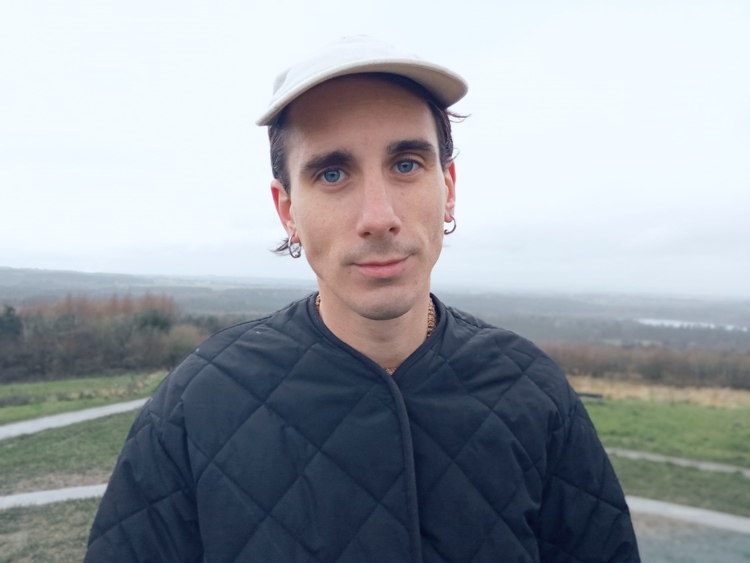Liverpool-based Andrew PM Hunt has been building a distinct musical microcosm. Alongside a fruitful bunch of one-on-one collaborations as Land Trance or Raft Of Trash and his role in bands like Ex-Easter Island Head, the focal point of his microcosm is his alias Dialect. Fluctuating between the acoustic and synthetic, Hunt built a world that is characterized by intricate textures, experimentalism, and chance. The music he releases as Dialect is imbued with central themes lent from geography and nature, soothingly melodic and packaged with a comforting charm to it. Hunt uses this alias also to present his newest work, Under~Between: the album spans a longer period of recordings, realized in its entirety before the pandemic, while living and working in a communal house in Liverpool.
To put Hunt into the center of his musical cosmos, however, is only half the truth: his latest album sprung from engaging in an array of joint efforts with artists like Nick Branton, vocalist Hannah Bitowski, improvising percussionist David Kelly, as well as the chamber group Immix Ensemble. Somewhere in between composed and improvised, their collaborative aspect is central to the feel, sound, and intuitive nature of Under~Between as a whole. Leonard van Hout met up with Hunt to discuss the new album.
LVH In an interview you did early on in the pandemic, you said it was a tough time to create new material. Quite some time has passed since the pandemic’s beginning and said interview. How are things going at this point?
AH I think the hard thing about making any kind of creative work during lockdown has been not having a sense of the future and not having a sense of the world whatever you’re making is going to exist in. It’s almost like not having any context for the work you’re making anymore. But it’s gotten a little easier to get on with it, to just sort of fall back into old habits in a way. And I’ve been lucky to be able to keep collaborating with some of the people I live with, that is kind of what kept me going.
LVH Assuming you too are spending more time at home, how does that influence your processes as an artist?
AH I’m not sure if it really affected my musical output very much to be truthful. But it certainly offered a chance to reflect on various different aspects of our society and of our lives—the way that we organize our lives around work and the way that we organize our identities around our work, free time, and the pace of life. It definitely afforded me the opportunity to rethink some of those kind of “core aspects” of living, basically. Also living in a big shared house over the course of the lockdown was interesting at times, it was almost like this kind of microcosm of society. It could feel like you’re really able to see the dynamics of a group, how people react differently to stress, and how people react differently to good news, bad news, and, you know, the rest of it.
LVH You live with about 15 other artists and musicians in a shared house, right? How is that?
AH I actually get a bit fuzzy sometimes about the exact number of people. It’s like… I think it’s actually 13 or 14? It’s in a sort of transitional phase, we’ve been living together off and on in various different places for the last ten, twelve years or so. It’s a group of friends that largely evolved from the music scene in Liverpool I suppose, but there’s all sorts of people here by now. It generally means that there’s an atmosphere of creativity and a kind of openness to ideas. This has been really, really helpful—during the pandemic but also just in normal times. It’s incredible to have such creative friends around, not just to work with, but also for sharing ideas. Sometimes it almost feels as if we move a sort of swarm in terms of ideas we’re all interested in and how we’re influencing each other. And I think that’s really fun.
LVH Interconnectedness between nature, humankind, and technology is a recurring theme in your work, but this interconnectedness also seems present on a more personal level—between you and the people you live or collaborate with. Is that one of the album’s themes as well?
AH Absolutely. I mean, everything is affecting everything else, you know. That’s the thing that becomes very clear in a shared living environment like ours. Everybody is carrying a little energy around with them, which is affecting the energy of the people around them. So you’re hyper aware of how your presence affects other people. And that’s something that, I guess, is also mirrored more widely in the world, this idea of interconnectedness. I was reading quite a lot about this when I was putting the album together—it’s a thing in Buddhist thought, but also in cybernetics and systems theory-type thinking. There it’s not that A leads to B, but rather it’s that A creates the conditions for B to also exist which also creates the conditions for A to have ever existed. They are all constantly in this sort of circular, reciprocal kind of dance with each other. This is something really, really influential in my thinking, and also in a really specific musical and kind of technological way.
LVH …like a feedback loop? Could you give a concrete example of that?
AH There was quite a lot of processes on the record which make use of a kind of mimicry. So I might have a recording of my friend Nick playing the bass clarinet, for example. But I’ll be converting it into MIDI, which will then be triggering some sine waves that then he’s hearing coming back to him. And then as he’s changing how he’s playing, the computer is trying to read him, and he’s trying to read the computer—they get in a sort of tangled mess. Sometimes it doesn’t work that well and other problems arise which you have to kind of solve musically. There’s a track called “Flame Not Stone” and the second half of that piece uses a digital piano. It was created by just repetitively pressing one key on the piano over and over again and a computer is reading the output of the piano and trying to figure out what pitch it is and then making a MIDI note for that pitch and then sending it back into the piano—but it’s got it slightly wrong. And then the piano is playing that wrong note. Then the computer hears the wrong note and then it does the same thing, sends that back into the piano. You get this kind of feedback loop, where suddenly complexity arises out of the simplest origin. I find processes like that really beautiful.
LVH It’s like technology improvising in a certain way? Usually, technology is portrayed as ultimately coming down to ones and zeroes, where there is no space for irrationality or randomness.
AH I like the idea of reformulating what a mistake is. How much of creativity is just mistakes happening that you actually quite like? And then honing in on that mistake and figuring out what was good about it? That was a really strong aspect of the recording process.
LVH The album seems very personal to me, as if a lot of your own interests are actually audible in the record itself, drawing from nature, geography, this technology aspect. Where do these interests stem from?
AH I used to live in the USA and we did a little bit of traveling there, particularly in the Southern states. I think there’s something about discovering those landscapes at the time that sort of made a light bulb go on in my mind. I certainly was able to kind of catch a little glimpse of this kind of interconnectedness that we’ve been talking about. It sort of filled me with a real sense of respect and fascination with the complexity of nature and natural spaces, the way that we inhabit them as humans, the impact that we have on them, and the way that our behavior is shaped by things like geography or just the shape of the land. I guess it’s something that’s just sort of developed over time, really.
LVH How does something like that end up in your music? Is it an overarching approach, or is it also a more direct source of inspiration?
AH A lot of things that I read or am interested in tend to “seep” into my music slowly over time. Generally speaking, when I’m making music, I have two phases. The first phase is incredibly free and I just let myself do whatever I’m compelled to do without really questioning it too much. And then there’s a very distinct second phase, where I’m editing and trying to see patterns and recurring ideas starting to surface. I am ruthless in this stage. That second phase, I guess, is where all these influences from the natural world, from reading, from other artists, and from stuff like that come together.
LVH I did catch some references to birds in your album, in track names, and at some passages, you seemingly hear actual birds chirping. Where does that come from?
AH There’s very few actual birds, but there are some. Actually, the artwork is also made from sonograms of bird calls. So those sort of splattery marks on the cover are derived from birds I recorded. It’s funny, I mean, there’s such a rich tradition in music for composers and artists to be interested in birdsong, so don’t think that I am unique in any way for exploring this. Still, this lineage is interesting to me. You can barely go any place where you can’t hear the sound of birds, and yet they seem so inscrutable to us. I like to watch birds and what I really enjoy about it is just how it changes your appreciation of time a little bit. When you stop and decide “okay, for the next hour or so, I’m just going to concentrate on this really small thing that is happening in the world and I’m going to put all my attention on that.” When you do that, your experience of each moment passing somehow just totally changes, you lose track of other things. You realize that you can decide to concentrate on absolutely anything that you want, and that when you do, you’ll discover an insane world of complexity and possibilities. As soon as you decide to give something that quality of attention, you will discover worlds within worlds within worlds, and that’s the thing that I love so much about watching birds. And they’re cute, and I love a nice cute bird.
LVH I was thinking about something like that a while ago… As opposed to the city’s overload of stimuli, impulses coming from nature just seem nicer to process—as if they cause less stress or something.
AH There’s a natural rhythm to it that somehow maybe is less stressful, I don’t know. But it’s amazing how good our brains are at filtering out all that stuff. If you take a walk with somebody who’s not interested in birds, it can sometimes take quite a long time to point out a sound to somebody and be like, “oh, no, can’t you hear that? Can’t you hear that song thrush?” And that would just not be on their radar—which is fair enough. It’s another thing that reminds you of how subjective all of our listening is. There’s a huge collaborative aspect to listening as well. Somebody listening to my album is sort of co-creating the experience of the album by their totally subjective perception of what these sounds mean, what they mean when they come together, and what your association for a specific sound is. The sound of a saxophone can have a totally different meaning to someone else than it has to me.
LVH Talking about instruments, what also struck me about the album was the broad range of techniques, with vocals, various acoustic instruments, as well as digital or synthetic sound design. I feel like many musicians maybe tend to lean towards one aspect only, or like to specialize in some sort of way. You seem to be more invested in broadening your ways of making music…
AH I’m the opposite of a purist, I think. I absolutely believe in a kind of pluralistic approach to all this kind of stuff. But it’s funny to be working with these instruments, like the ensemble’s instruments on this record, because it actually has quite a sort of long, deep link to my childhood. Both my parents were keen musicians. They were teachers by profession but they used to play in performances, plays, concerts, and things like that sometimes. So these particular acoustic chamber instruments have a real connection to my childhood, and hearing my parents playing these instruments. It’s almost making me go back in time, in a weird sort of way. But yes, for me it’s really important to try and create a sense of dialogue between the organic acoustic sounds and this more sort of plastic, digital electronics. They shouldn’t be two things that are happening separately, they should be meshed as they are in life. Technology is an inherent part of who we are and what we do. It’s silly to make the distinction between acoustic and digital, really, because I mean, of course, the saxophone is a piece of technology, and a cello is a piece of technology… They’re from a different era of course, but they’re just the instruments, tools. It seems obvious to me that they should be next to each other.
LVH This very musical upbringing is interesting. I think I’ve also read about you making music in church when you were young, is that right?
AH Oh, God, yes… That’s kind of where I learnt it.
LVH So there’s this more classical notion of music; composed, perhaps more bound to rules or conventions, or maybe more rigid in some ways. Whereas your music seems to flow more freely, as if it’s a sort of flow of consciousness you’re listening to. So how do you balance those things? Is that also a sort of mesh, like the instrumentation?
AH I think in some ways, a lot of my musical journey over the last ten years or so has been me unlearning things about music, and unlearning certain conventions, or whatever. But I think that at my core, I have an understanding of sort of tonal music, and that underpins whatever I do, no matter what other elements I’m bringing in or no matter what other ways or strategies I’m trying to develop to undermine those kind of root sensibilities. I think they’re always there, just from my childhood and stuff.
LVH I can imagine it’s a matter of finding balance. You have this background and technical knowledge of music, yet the album is very much a project of intuition of improvisation. Do you feel like that background is something benefiting you? Does it provide some sort of base to use as a starting point for improvisation?
AH It’s a constant battle. On the one hand, you’re right. It does make it easier to improvise in certain ways, because you’re aware of what types of things will work and how to do that. But on the other hand, you’re also always close to being pulled into some sort of cliché, some sort of idea, or a sort of set way of working that is already established. So it’s good to have that knowledge, I suppose, but I’m constantly trying to un-think it and I’m constantly trying to remind myself of different ways to put things together. So that’s part of the reason why collaborating and improvising with other people is really important. My music as Dialect is kind of composing with improvisations. I’m constantly working between the improvising intuitive world and then this desire to compose, finesse, and sculpt things. So doing this album was like trying to tread a fine line where I didn’t want things to end up feeling too rigid or too composed, in a way. I wanted it to feel like a fleeting moment captured. In some parts of the record, that’s how it is, and other times, I’m trying to create a kind of fiction.
LVH When I was listening, I did have the feeling that it was like listening to someone’s flow of consciousness, freely moving into different directions. It’s interesting how your flow of consciousness can take you in such different ways in such short time, yet still make sense in some way.
AH Or you’re coming back to something that you were talking about just before and realise that you went on a completely different path for a few minutes… I think one of the things that was important in working with improvisation is keeping a kind of sense of humor to it, keeping it light, not to let it become this academic, studious sort of thing. You know, there were actually a lot of moments during the recording of the album which were just really, really funny. Just stupid things, but things that make you feel like anything’s possible. That sense of potential and possibility is at the heart of the record, in a way. It seems like things could go any way.
LVH So what is next? Is this album a starting point for new ventures or directions?
AH I’m still very much in that phase of just making things and not questioning it too much. I’m not exactly sure, but I think one thing that is likely is that the next album will feature the voice more prominently. Because I do actually come from this background of writing songs, singing, things like that—that’s not foreign to me. The sound of Under~Between is quite distinct because it came from working with this particular chamber ensemble, working with these particular instruments. So the next thing will probably be quite different.
Dialect’s new album Under~Between is out now via Rvngl Intl.
